Lawyering Peace
Episodes
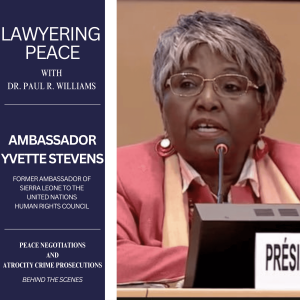
Monday Feb 10, 2025
Monday Feb 10, 2025
Ambassador Yvette Stevens, Sierra Leone's first female engineer, reflects on her groundbreaking diplomatic career at the United Nations and her nation’s tumultuous journey to peace during and after the civil war (1991–2002). In this compelling episode, she delves into the complex dynamics of the Sierra Leone Civil War, the controversial Lomé Peace Accord, and the innovative Special Court for Sierra Leone.
Ambassador Stevens shares her perspective on the delicate balance between peace and justice, revealing how the Special Court for Sierra Leone was established despite the Lomé Agreement’s amnesty provision. While Sierra Leonean citizens initially may have wished that more international resources were put towards reconstructing the country rather than to pursuing justice, the Special Court proved groundbreaking, achieving several firsts in international law, including:
Prosecution of child soldier recruitment.
Conviction of forced marriage as a crime against humanity.
Prosecutions for attacks on UN workers.
The first trial and conviction of a former head of state since Nuremberg.
Gain unique insights into Sierra Leone’s path to peace, the importance of gender-inclusive negotiations, and the enduring power of human rights as a cornerstone for lasting stability in this episode.
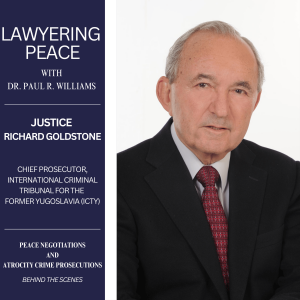
Tuesday Feb 04, 2025
Tuesday Feb 04, 2025
In this episode, Justice Richard Goldstone recounts his remarkable journey from working within the South African justice system to dismantle apartheid to serving as the first Chief Prosecutor for the International Criminal Tribunals for the former Yugoslavia (ICTY) and Rwanda (ICTR). He delves into the challenges of pursuing justice amid political resistance, from using judicial discretion to challenge oppressive laws and expose state-sponsored violence, to navigating the complexities of UN bureaucracy and funding constraints. Goldstone reflects on the groundbreaking impact of the ICTY on international law, including advancements in prosecuting gender-based crimes, and the enduring tension between peace and justice. His insights underscore the critical connection between justice, accountability, and sustainable peace.
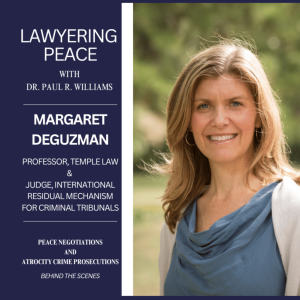
Tuesday Jul 16, 2024
Margaret deGuzman: Re-Imagining Justice
Tuesday Jul 16, 2024
Tuesday Jul 16, 2024
In this episode of the Lawyering Peace podcast, Dr. Paul Williams engages in a thought-provoking conversation with Professor Meg deGuzman, Professor of Law and Co-Director of the Institute for International Law and Public Policy at Temple University. Professor de Guzman, a distinguished judge at the International Residual Mechanism for Criminal Tribunals and Senior Peace Fellow at PILPG, shares her expansive view on the role of justice mechanisms in building durable peace.
Throughout the interview, they explore the complexities and nuances of international justice and the evolution of accountability. Professor deGuzman highlights the potential of non-judicial accountability mechanisms, such as truth commissions and reparations. While the proliferation of judicial mechanisms like the International Criminal Court has been significant, she points out that these non-judicial approaches are not receiving the same attention but hold substantial promise for contributing to justice and durable peace. Reflecting on her experiences from the Rome negotiations for the International Criminal Court to her work at the Yugoslavia Tribunal, Professor de Guzman provides a candid assessment of the impact of justice on peace processes.
Join us for a compelling discussion on the evolving landscape of international justice, the successes and limitations of current mechanisms, and the critical role that diverse accountability mechanisms can play in fostering lasting peace.-------------
Host & Executive Producer: Dr. Paul R. Williams
Co-Producer & Content Manager: Katie Hetherington
Co-Producer & Creative Manager: Ryan Westlake
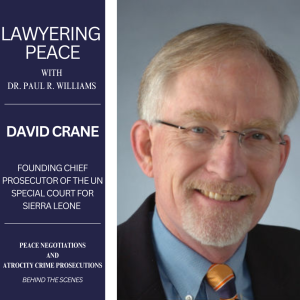
Thursday Jul 11, 2024
Thursday Jul 11, 2024
This episode of Lawyering Peace, features Chief Prosecutor for the UN Special Court for Sierra Leone (Special Court), David Crane. Crane is renowned for indicting Charles Taylor, the former President of Liberia, marking the first time a sitting head of state was held accountable for atrocity crimes. Given this milestone, the Special Court has been used as a blueprint for subsequent international criminal tribunals.
The episode delves into the effectiveness of the Special Court in establishing durable peace and explores the conflict in Sierra Leone that led to its creation. It also examines the blanket amnesty provided in the peace agreement that ended the conflict and the impact of the Truth Commission that was conducted prior to the court's mandate.
David Crane shares some of the unique challenges and unexpected obstacles he faced as Chief Prosecutor, providing a vivid account of his experiences.
Notably, David’s story exemplifies how “the rule of law is more powerful than the rule of the gun”.
Tune in to gain insight on navigating the politics of justice.
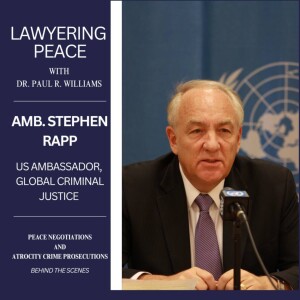
Monday Jul 08, 2024
Stephen Rapp: Global Criminal Justice
Monday Jul 08, 2024
Monday Jul 08, 2024
Ambassador Stephen Rapp, former US Ambassador-at-Large for Global Criminal Justice, joins Dr. Paul R. Williams in this compelling episode of Lawyering Peace, to delve into the crucial role of global criminal justice in shaping durable peace.
In this episode, Ambassador Rapp shares insights into accountability related to the Arab Spring, the Sierra Leone conflict, and the Rwandan Genocide, and emphasizes the importance of holding perpetrators of international crimes accountable. Drawing parallels to historical events, he discusses the delicate balance between granting amnesty for political crimes and ensuring accountability for atrocities. Ambassador Rapp tells us: durable peace is unattainable without justice.
Ambassador Rapp also explores the overarching importance of pursuing truth after an armed conflict, and the episode provides a candid analysis of current conflicts, including those in Ukraine and Syria, and the implications of prosecuting high-level officials like President Putin.
Reflecting on the progress made towards accountability in the 2010s, Ambassador Rapp highlights the evolving landscape of international justice in an era of social media and civil society activism. Despite the challenges, he remains optimistic, asserting that the need for accountability cannot be ignored.
Tune in for a deeper understanding of the intersection between justice and peace, and the essential role of international criminal justice in securing a just and lasting peace.
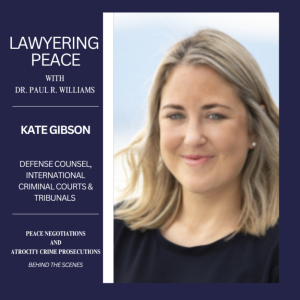
Tuesday Jun 18, 2024
Kate Gibson: Defending Justice
Tuesday Jun 18, 2024
Tuesday Jun 18, 2024
In this episode, Dr. Williams speaks with Kate Gibson, an experienced lawyer who has represented former heads of state, military leaders, and victims of international crimes before international criminal courts and tribunals since 2005. Kate discusses how these tribunals can sometimes hinder peace, especially in cases of victor’s justice and when the process is too disconnected from the affected communities. She also addresses the growing skepticism about the International Criminal Court’s ability to contribute to peace and provide victim catharsis. Tune in to hear Kate challenge the popular belief that we are in an ‘Era of Accountability’.
--------------------
Host & Executive Producer: Dr. Paul R. Williams
Co-Producer & Content Manager: Katie Hetherington
Co-Producer & Creative Manager: Ryan Westlake
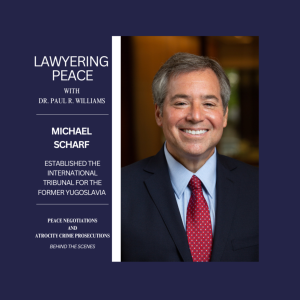
Friday May 10, 2024
Friday May 10, 2024
In this episode, Dr. Paul R. Williams speaks with Michael Scharf, a drafter of the Statute that created the International Criminal Tribunal for the Former Yugoslavia (ICTY). Initially intended by the international legal community as a symbolic gesture, the tribunal became a powerful instrument of justice under a prosecutor whose unwavering commitment to justice over political convenience challenged the status quo of international practices. We explore how this commitment to justice impacted the Balkans peace processes, the role of international tribunals in balancing peace and accountability, and the legacy of the ICTY in shaping future tribunals and the International Criminal Court. Tune in for insights into how justice challenges peace negotiators today.